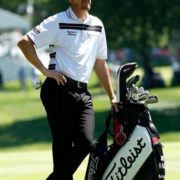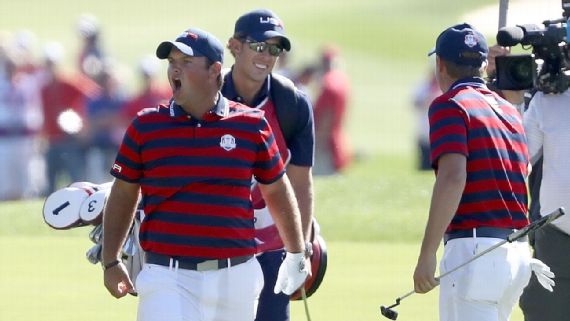Mass. maker of Titleist golf equipment ready for $435 million IPO
By Dan Adams GLOBE STAFF
A new symbol will soon scroll across the New York Stock Exchange ticker: GOLF, representing Fairhaven-based Acushnet Holdings Corp., maker of Titleist golf balls and other golf equipment and apparel.
The initial public offering next week — hinted at for more than a year — will peg the market value of Acushnet at around $1.7 billion. The offering is expected to raise roughly $435 million with the sale of 19.3 million shares priced between $21 and $24. Previous investors, not the company, will reap the proceeds.
Thanks to a series of related transactions in advance of the offering, the majority of voting shares will be retained by Fila Korea Ltd., which has owned Acushnet since 2011.
A spokeswoman for Acushnet, which was founded in 1910, declined to comment, citing a legally mandated “quiet period” in advance of the IPO.
Acushnet operates golf-ball manufacturing plants in New Bedford and Dartmouth and said it employs about 5,200 full-time workers worldwide, including 1,500 at a glove factory in Thailand. Federal filings indicate the company lost $1 million last year on $1.5 billion in sales of products under several brands it owns, including Titleist and FootJoy Golf Wear.
The offering comes in a year that has seen a substantial reduction in the number of IPOs in the United States: Just 85 have priced so far this year, down from 170 last year and 275 in 2014, according to Renaissance Capital. In Massachusetts, most of the 10 IPOs by local companies so far this year were by life sciences and technology firms; Acushnet’s would be the first by a consumer goods outfit.
Kathleen Smith, the manager of IPO-focused exchange-traded funds at Renaissance, said the slowdown is largely attributable to private companies with high valuations that are proving to be a tough sell on Wall Street.
“Investors right now are very cautious about overpaying,” Smith said. “That makes [IPOs] hard for companies that don’t want to admit they’re not worth as much as they think they are on the private market.”
Smith said investors may be drawn to Acushnet’s IPO by Titleist, one of the most iconic brands in the $8.7 billion golf industry. On the other hand, she noted, the sport itself is in a decline, and other companies such as Nike and Adidas have pivoted away from golf equipment following successive years of declining sales. Golfsmith, a major retailer and Acushnet customer, declared bankruptcy last month.
“The industry is not that robust, so you need to have a strong relationship with diehard golfers,” Smith said. “Acushnet has good brands, and that’s important.”
Just 24.1 million people in the United States played at least one round of golf last year, according to the National Golf Foundation, down from 30 million in 2005.
Enthusiasm is even lower among those 18 to 34 years old, a group whose participation dropped 30 percent over the past two decades. A majority of youth surveyed by the NGF called golf “boring.” And while the number of people trying golf for the first time is rising, few of those players come back for a second helping.
Observers cite a confluence of factors in explaining golf’s subpar performance, including the lack of a new Tiger Woods-level star, the suburban location of most courses in an era of urbanization, and the length of games. They also speculate that the high cost, reputation for exclusivity, and stuffy traditions of the sport are particular turnoffs for younger players.
In response, some operators are trying to jazz up their offerings. Woods himself recently opened a beginner-friendly section at his Bluejack National club in Texas, where groups can play under lights at night, blast music, and wander from hole to hole in any order. The course, called “The Playgrounds,” also lacks any rough or brush, an attempt to reduce the time spent poking around for lost balls.
A fragile Tiger Woods taking his time to return to professional golf
NAPA, Calif. — The comeback is on hold, along with a sobering admission from Tiger Woods. His game is “vulnerable” and not yet ready for competition. And perhaps not for prime time viewing, either.
How much this has to do with Woods’ own insecurities about his game and how it might look are all part of the complex package you get when dealing with someone who was so stunningly good for so long and who is now faced with being far away from those dizzying heights of greatness.
“After a lot of soul-searching and honest reflection, I know that I am not yet ready to play on the PGA Tour or compete in Turkey,” Woods said on his website. “My health is good, and I feel strong, but my game is vulnerable and not where it needs to be.”
That Woods, 40, would be so blunt as to his own deficiencies right now is jarring, even knowing that the 14-time major winner has been through a significant amount of pain and a slow rehabilitation from two surgeries late in 2015.
It was Woods, after all, who opened up the door to this return, saying more than a month ago that he “hoped” to be back this week at the Safeway Open but also noting that he had a lot of work to do in that period to get ready.
The Ryder Cup — where he was a vice captain in Minnesota — and Hurricane Matthew near his South Florida home didn’t help from a preparation standpoint. Neither was a Tiger Woods Foundation event on Monday and Tuesday a couple of hours down the road from here at Pebble Beach, where he was the host of a big fundraiser.
And yet with all those distractions, Woods officially committed to the Safeway Open on Friday — only to pull out three days later.
The timing is odd and has led to numerous conspiracy theories about his motives. It certainly is not helped by the lack of information about his rehabilitation, his practice routine or how much golf he has played.
Notah Begay, Woods’ long-time friend who also works as an analyst for Golf Channel, said Monday that the golfer had only begun hitting drivers in earnest six weeks ago. And yet Woods’ agent, Mark Steinberg, said way back in April that Woods had worked that club back into his practice routine at that point.
He was hitting drivers during a clinic, a full-out practice session and a five-hole outing when he opened up his Bluejack National golf course design in Houston later that month, but the information about his practice pretty much dried up afterward. Woods said in June that he had yet to put multiple days of golf together.
“There are no physical complications at all,” Steinberg said Monday. “I don’t know if it’s mental or just (his) golf game. He hasn’t played competitive golf in 14 months now. As he’s worked at his game of late, he just felt it wasn’t up to the quality necessary to compete right now.”
Why Woods felt his game was OK on Friday but not on Monday is just another in a long line of mysteries surrounding the golfer, who has endured three back surgeries and four knee operations in a career that used to routinely see him rebound from layoffs, maladies and even arthroscopic procedures.
But the back surgeries have been a different deal. Throw in his well-documented chipping woes from early in 2015 and it shows just how many pieces have to be put back together.
Woods said that his first holes of golf came in April — eight months after he had tied for 10th at the Wyndham Championship. Even there, Woods had swing issues that needed to be addressed, and they weren’t magically going to be cured when he first picked up a club again.
So there were the physical problems to overcome, a work-in-progress swing and short-game issues, just to start. Then came the ability to practice and play regularly. Throw in the mental side of putting it all together and we have perhaps what has never been associated with Woods — fragility.
Those seven days at the Ryder Cup didn’t help his preparation, but they certainly were a boost to his competitiveness.
“It gave him even more energy: ‘Man, I want to be back in the locker room,”’ Steinberg said. “It lit even more of a fire for him. But when he realized that his game just wasn’t there, it was very frustrating.”
Steinberg said Woods felt he didn’t believe it was “appropriate” to make his return at the Turkish Airlines Open, a European Tour event. It was out of “respect for the PGA Tour” that he is skipping that tournament abroad next month, not some doom and gloom scenario that keeps him from being ready then.
Of course, there are other PGA Tour events after that and before the Hero World Challenge in December in the Bahamas, where Woods hosts the annual tournament for his foundation.
Perhaps he sees a softer opening for himself in the Bahamas. Woods has a home in the resort community of Albany on New Providence in The Bahamas and knows Albany Golf Course, one that is relatively benign. The tournament features just 18 players, but it was at the same event — one he has won five times — played in Orlando two years ago where he tied for last.
The good news is Woods now has another two months to prepare. He’ll have the various corporate and foundation duties that take up his time, but there should be plenty of room for repetitive rounds of golf, recovery and practice.
The next step then is tournament golf, ugly or not. At some point, Woods needs to jump back between the ropes, take a few hits and learn to cope with the game on a level he made look so easy for so long.
If not December, then when?
United States takes victory in rowdy Ryder Cup
The Ryder Cup is back in the hands of the Americans.
For the first time since 2008, the United States defeated Europe in the biennial golfing showdown Sunday.
Ryan Moore two-putted on No. 18 for a 1-up victory over Lee Westwood, giving the Americans a 15-10 lead that sealed the overall win.
The victory completed a two-year soul search for the Americans after they were routed in Gleneagles for a third straight defeat. They formed a task force to address the shortcomings and delivered an emphatic performance at Hazeltine National Golf Club.
Ahead of the final day of competition, the PGA of America pleaded with the raucous crowd to be respectful of all participants.
The PGA issued a statement Sunday saying security staff would remove any fans who “are disruptive in any way, including the use of vulgar or profane language directed at the players.”
Galleries of more than 50,000 packed the golf course over the first two days of the event and made their voices heard as they backed the Americans.
Europe’s Rory McIlroy was at the center of much of the heckling, and he responded forcefully after making big shots. Patrick Reed hit the tape ahead of McIlroy for a 1-up win in the first — and arguably most contested — match of the day.
In other matches, Rickie Fowler edged Justin Rose, Brandt Snedeker beat Andy Sullivan, and Brooks Koepka routed Danny Willett.
The Associated Press contributed to this report.
Latest News
 Foxfire Golf Course UpdateAugust 11, 2020 - 7:09 pm
Foxfire Golf Course UpdateAugust 11, 2020 - 7:09 pm Major questions about Tiger, Brooks and more with Masters one month awayMarch 10, 2020 - 8:52 pm
Major questions about Tiger, Brooks and more with Masters one month awayMarch 10, 2020 - 8:52 pm How often should you replace your irons?September 29, 2019 - 10:09 am
How often should you replace your irons?September 29, 2019 - 10:09 am Gary Woodland’s journey to U.S. Open championJune 17, 2019 - 5:37 am
Gary Woodland’s journey to U.S. Open championJune 17, 2019 - 5:37 am Cantlay (64) Rallies From 4 Back To Win MemorialJune 3, 2019 - 12:42 pm
Cantlay (64) Rallies From 4 Back To Win MemorialJune 3, 2019 - 12:42 pm
Promotions
Club Events
Business Hours
Contact Us:
Foxfire Golf Club
389 Canterbury Road
Commercial Point, OH. 43116
Our Location
389 Canterbury Road
Commercial Point, OH. 43116
Pro Shop
(614) 224-3694






